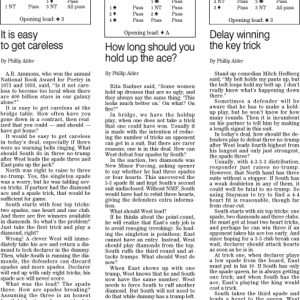Succeeding in Your Business
Browse MoreDescription
Can You Copyright a Common Name?
By Cliff Ennico
“I just watched your YouTube video on basic copyright law and didn’t hear you touch on this subject, so I thought I’d drop you a line and ask you this question. I’m having trouble understanding the part of copyright law that does not extend to titles, names, slogans or short phrases.
“I wrote a story a few years ago and did all kinds of research on character names to make sure they hadn’t been used before. But recently I found out that the first and last name of my main character was used by a minor character in one episode of a TV show. I can’t say I’m surprised by this because it’s a name made up of a common first name and a common last name. The two characters have nothing in common except they have the same name.
“I’ve heard you can’t copyright names, but you can trademark them. I’ve heard multiple things regarding names in fictional works but don’t know what to believe. I didn’t use Harry Potter, James Bond, Rocky Balboa, Darth Vader or any names that are trademarked or well known by the masses.
“My situation is serious because, due to the nature of the character, I need to use this name, and without this character having a normal name, I’ll have to scrap the entire project. So my question is … can fictional characters from two different works have the exact same first and last name?”
I’ve always envied people with extremely common names, such as John Smith or Mary Jones, because they can get away with just about anything. If you went to grade school with a John Smith who bullied you, any John Smith you bump into in adult life could always get away with saying, “Well, that was probably some other John Smith,” even if he actually was your kindergarten tormentor.
With a name like Clifford Ennico, however, there’s no place to hide — if you ever had a bad childhood experience or cringeworthy blind date with a Clifford Ennico, it was almost certainly me.
There are two questions this reader is really asking. The first one is fairly simple: Can characters in multiple literary works have the same name? Yes. Generally, the appearance of a name in a copyrighted work does not create a copyright in the name itself (although a character name can be trademarked — see below).
The second question is a bit tougher to answer: Can you use a common name for a literary character without being sued by anyone? The short answer is yes, but there are a few things you need to do.
First, you need to include the following disclaimer on the title and copyright pages of the finished work: “All characters in this work are fictional. Any resemblance to any actual person, living or dead, is strictly coincidental.” That phrase has gotten many first-time authors out of hot water.
Second, you need to check the federal trademark records (visit the United States Patent and Trademark Office website and search the name in the trademark database) and make sure the name hasn’t been trademarked. Celebrities often trademark their names, even if they are fairly common. One of the most famous country western musicians of all time, the late George Jones, trademarked his name for a wide variety of products such as music recordings, restaurants and steak sauces. So if your character is a musician or restauranteur named George Jones, I would rethink that a bit. If your George Jones character is a funeral director, no worries.
If you are still nervous that a legion of Bill Smiths is going to launch a class action against you if your character becomes notorious, consider changing the character’s first name slightly. American country western singer and sausage entrepreneur James Ray Dean always used Jimmy Dean as his trademark to avoid confusion with the Hollywood actor James Dean (something British rocker David Essex had some fun with in his one and only hit song from 1973, “Rock On”). As Sheryl Crow noted in another hit song, “… he says his name is William/ but I’m sure he’s Bill or Billy or Mac or Buddy.” Substituting one of these for a William should work for a rural or blue-collar character. If he’s an Ivy League lawyer or Wall Street investment banker, put a Roman numeral at the end of his name instead (but not “III” — too many of those out there).
Another great strategy is to give the character a highly distinctive middle name. When the late Gene Roddenberry came up with the idea for “Star Trek” in the 1960s, I have to believe there were a lot of James Kirks and Jim Kirks around. There may even have been quite a few James T. Kirks. But a James Tiberius Kirk? You get the idea.
As a final caution, you should avoid names of literary characters whose names are part of a book’s title: for example, “Olive Kitteridge,” “Caleb Williams,” “Stoner” or “The Storied Life of A. J. Fikry.” While character names cannot generally be copyrighted, book titles can.
Cliff Ennico (crennico@gmail.com) is a syndicated columnist, author and former host of the PBS television series “Money Hunt.” This column is no substitute for legal, tax or financial advice, which can be furnished only by a qualified professional licensed in your state. To find out more about Cliff Ennico and other Creators Syndicate writers and cartoonists, visit our Web page at www.creators.com.







Reviews
There are no reviews yet.